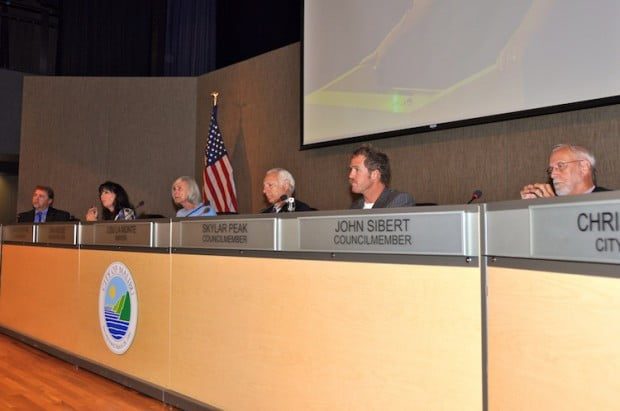
After several hours of emotional and increasingly nasty public comment in the debate over an ordinance to protect small businesses, Councilman John Sibert had had enough. He admonished the Malibu Chamber of Commerce at last week’s City Council meeting for not doing more to work toward a compromise that would accommodate both the business community and concerned residents.
“I didn’t see an attempt to find a middle ground, and I had hoped the Chamber would do that,” Sibert said.
The Chamber later defended its role in community outreach efforts.
“We play a crucial role in dealing with broad issues of commerce and capitalism within the community. To that end, we have worked to actively cooperate with the City of Malibu and the Preserve Malibu organization to find common ground that will promote actively successful businesses within our community,” Don Schmitz, the chairman of the Chamber of Commerce Executive Board, told The Malibu Times.
At the meeting, Sibert expressed disappointment in the hostility shown in the debate. That included the local landlords, preservationists asking for protections for small business owners and other citizens who have spoken out in favor or against Malibu enacting some type of retail ordinance. Arguments turned ugly and reflected the recent presidential election, he said.
“I had hoped we could bring in folks like the chamber and landowners and community members,” he said. “What we’ve ended up with looks an awful lot like the campaign of 2012. This has been demonization, vilification, setting hard and fast positions…there was no compromise.”
Schmitz refuted Sibert’s claims and said the Chamber had worked to support small businesses by offering up website space, sponsoring the “Shop the Bu” program and alerting the public about “cash mobs”— impromptu groups that show up at a local store and each promise to spend at least $20 to support that business.
The Chamber’s board voted to oppose a formula retail ordinance, believing that the “stick of government is not the solution to the problem,” said Schmitz.
Council asks for better definition of “community serving business”
The formula retail option was chosen over an alternate proposal for a commercial diversification ordinance, which would have required landlords to lease a certain amount of their tenant space to “community serving” businesses. The council felt the “community serving” was too vague, and that there was not enough legal precedence or case law for commercial diversification ordinances nationwide. They directed staff to come back with a better definition of “community serving.”
“No one knows what a community serving business is,” Mayor Pro Tem Joan House said in a telephone interview.
She said she was not sure if a community serving business would require its owner to live in Malibu, have grown up in Malibu or mainly provide a service to local neighborhoods.
House, La Monte take issue with possible lawsuits, “added layer of government”
Mayor Lou La Monte and Mayor Pro Tem Joan House said last week that drafting a retail ordinance on chain stores in the Civic Center would add “another layer of government” for shopping center owners in the free market. They also fear legal repercussions if a retail ordinance is enacted and local landlords take issue with it.
“In the past I’ve seen the city just do things that feel good and seem right, but cost the city a couple of million dollars in legal fees,” House said in a telephone interview.
La Monte stressed the financial strain lawsuits over the ordinance would put on the city’s budget.
“We know how much money this city has, we know what we pay in legal fees,” La Monte said.
Councilman Sibert, who voted in favor of drafting the ordinance, disagreed with their reasoning.
“Policymaking should not be driven by fear of litigation,” Sibert said.
